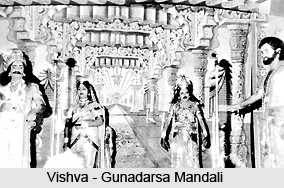 Vishva-Gunadarsa Mandali is one of the popular theatre groups in the Indian state of Karnataka. One of the actors of the day who carved out a brilliant career for himself as a proprietor was Vamanarao Master, who had become well-known for his musical ability and restrained acting even while he was serving as an actor with Sirahatti Venkobarao.
Vishva-Gunadarsa Mandali is one of the popular theatre groups in the Indian state of Karnataka. One of the actors of the day who carved out a brilliant career for himself as a proprietor was Vamanarao Master, who had become well-known for his musical ability and restrained acting even while he was serving as an actor with Sirahatti Venkobarao.
Early Years of Vishva-Gunadarsa Mandali
Vamanrao started his own professional troupe Vishvagunadarsa Nataka Mandali in 1913. Vamanarao had a flair for poetry. He had the skill of a playwright too, but he never risked any experiment until the troupe had found its feet. The first plays of the troupe had already held the stage with Venkobarao`s company. Mythological themes in Kannada theatre plays like Padmavati, Kalidasa, Krishna Leela and Indira were taken up again and produced with success. Once established, Vamanrao himself translated popular Marathi plays and staged them.
Popular Plays Staged by Vishva-Gunadarsa Mandali
The prominent among his successful translations for the Kannada theatre stage were Vidya Sadhana (adaptation of Khadilkar`s famous play Vidya Harana), Sandeha Samraiya, (Samsaya Kallol of Deval), Parvati Satva Parikshe (from the Marathi original Mahananda), Sant Sakhubai, Pundalika, Bajirao Peshve and Veera Abhimanyu. The striking characteristics of his plays were the homely language he used and the arresting tunes of the songs, drawn freely from those of Maharashtra. Vamanrao aimed at giving rich entertainment to his audiences and never stinted himself in this regard. He, like Venkobarao, had an eye for spotting talent and soon he gathered round him a number of gifted artists, the most prominent of whom were Gangubai Guledgudd, Mallikarjun Mansur, Gururao. Deshpande, Basavaraj Mansur, Keshavabhatta Modi and Ranebennur Mallappa, who were all popularly known for their musical and histrionic accomplishment.
Rise to Fame by Vishva-Gunadarsa Mandali
With this band of faithful artists, he toured Karnataka staging his own plays. In 1922, when he was in Mysore, he was honoured both by the people and the Maharaja Krisnarajendra Wodeyar IV. With his organisational abilities, training and talent, Vamanarao led his troupe from success to success. He shrewdly wound it up in 1934 when he took ill. He passed away in 1935. The life and career of this troupe was intimately related to the life and career of Vamanrao himself. He gave the troupe everything it needed to become steady and popular. Visvagunadarsa Nataka Mandali set new standards for the Kannada stage with regard to stage-music and easy flowing dialogues. The troupe`s plays did not exhibit the pomp and colour of the ones of Sivamurthiswami, nor the high ambition of the plays of Venkobarao; but they always assured a dignified presentation of an agreeable theme in intimate prose and alluring music.




















